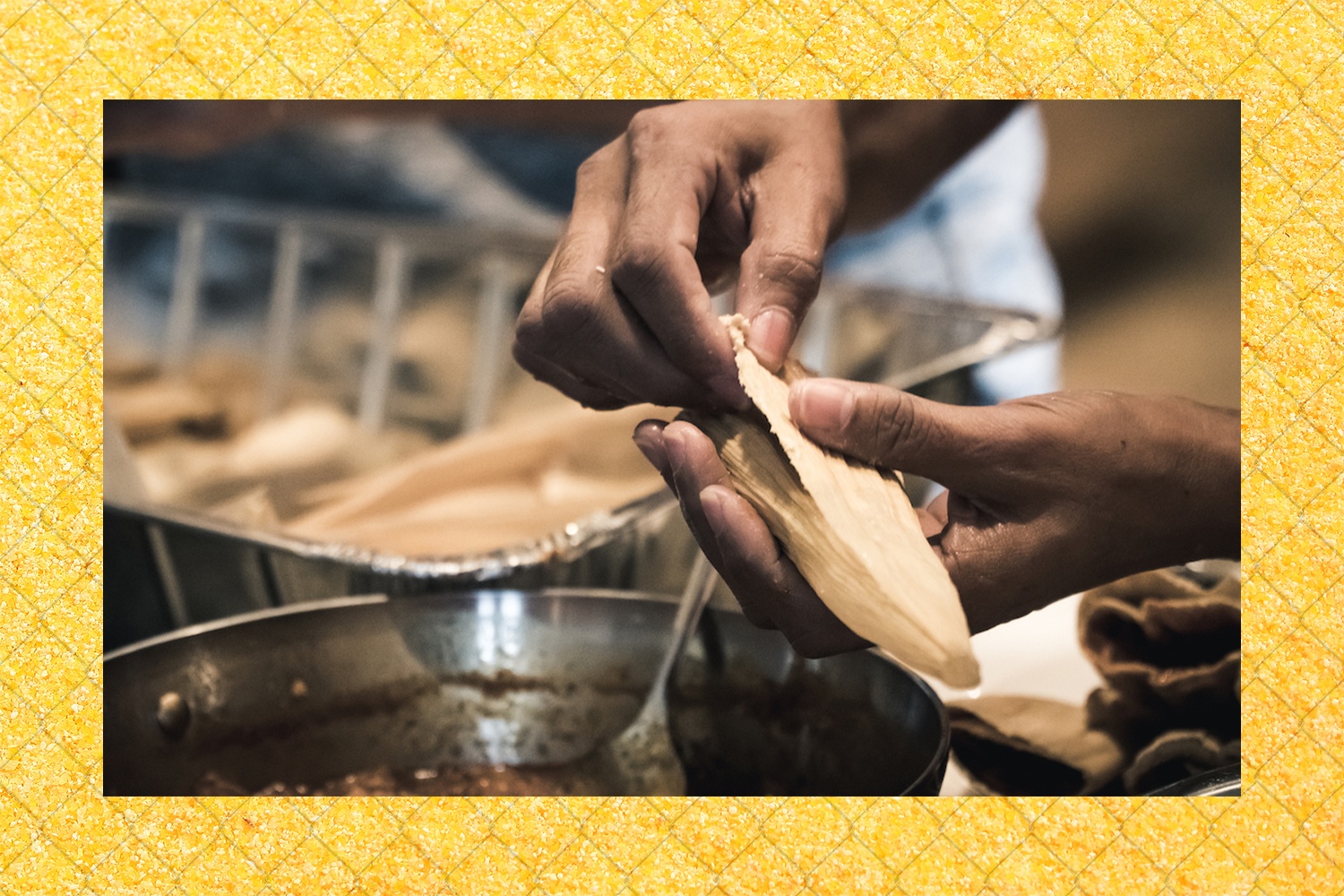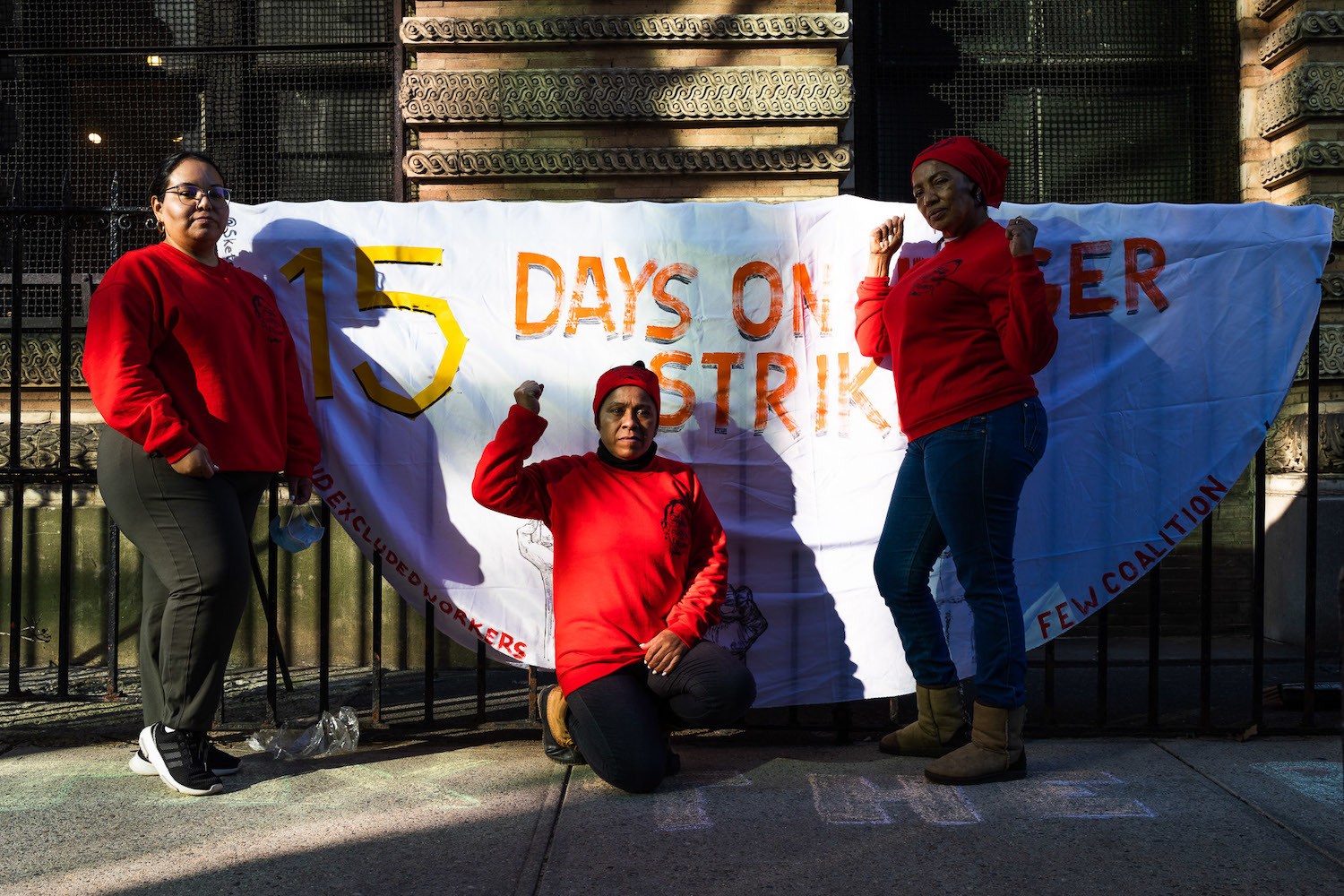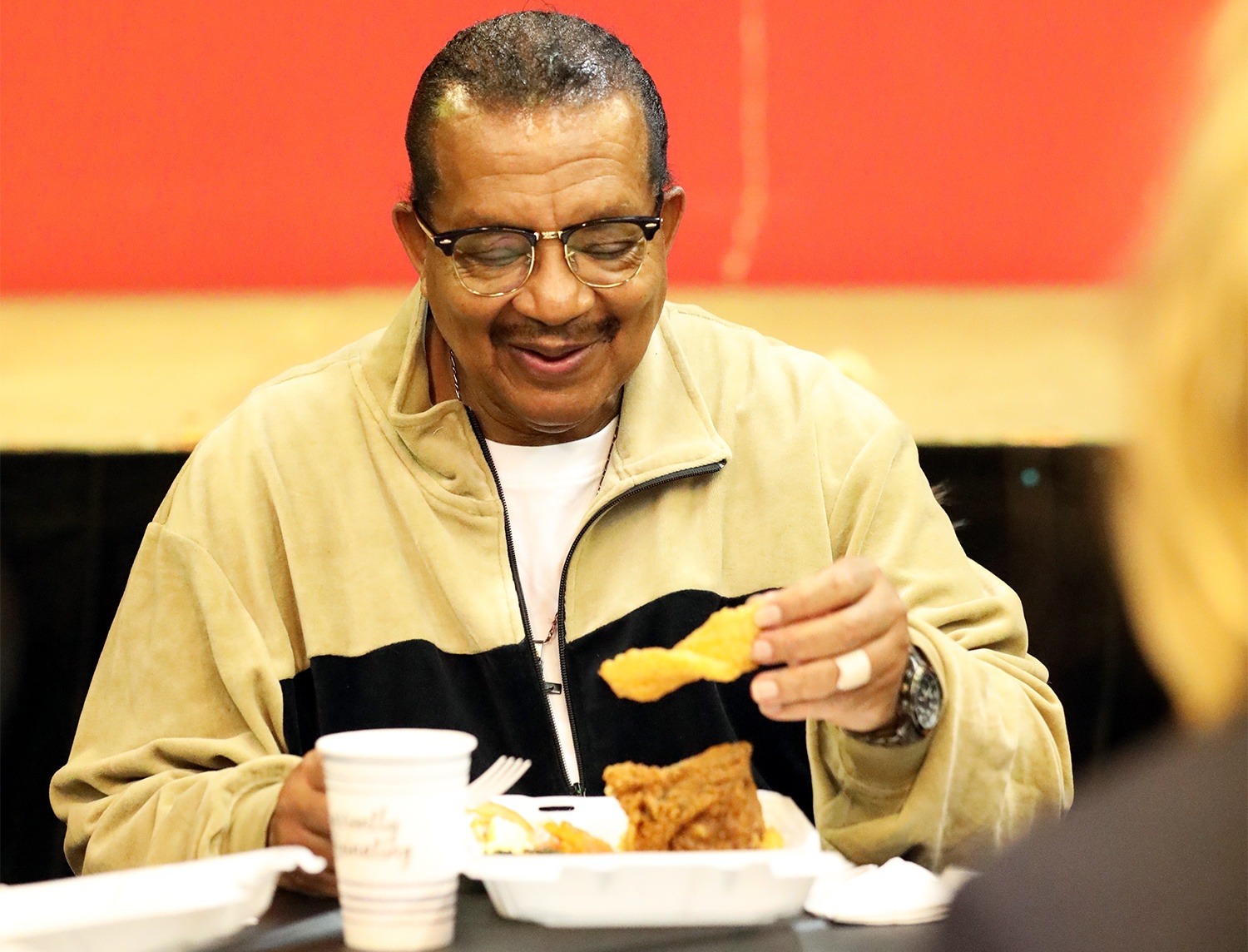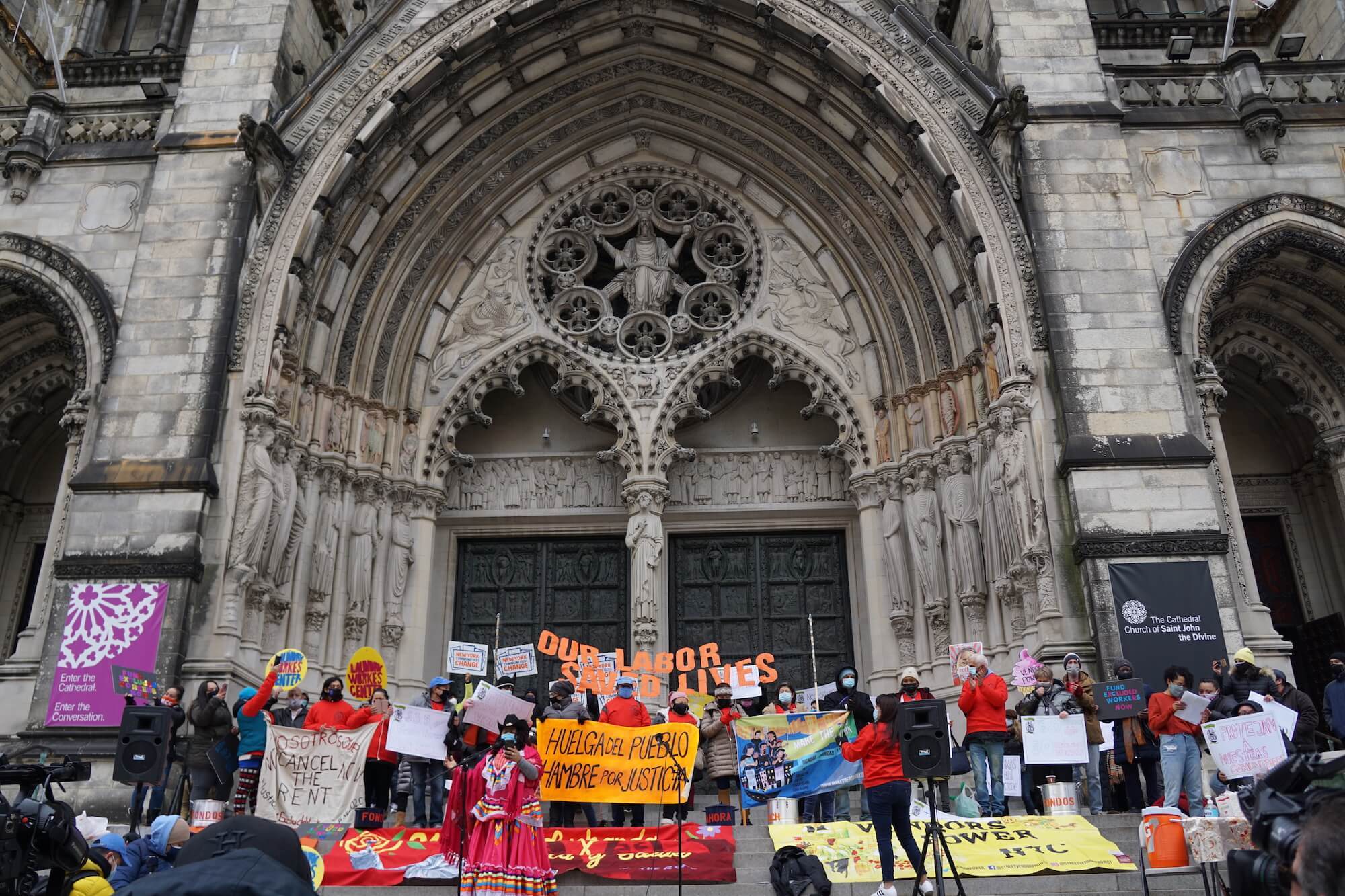
Graphic: Talia Moore/iStock
Nilson Barahona-Marriaga and Joe Thompson have never met, but they were detained by ICE at the same detention facilities in Georgia as Covid-19 cases proliferated. To survive their ordeal, both turned to cooking.
The commissary at the Stewart Detention Center was Nilson Barahona-Marriaga’s pantry. It was slim pickings, but the 40-year-old immigrant from Honduras made it work, spending his weekends in detention fashioning cakes out of dry cornbread, milk, peanut butter, and jelly, or making pounds of Honduran spaghetti using canned tomato sauce and commissary mozzarella cheese sticks melted with water in place of crema.
For his tamales, Goya seasoning and curry powder were used to spice “masa” he made out of corn chips, boiled water, and mayonnaise. Rice packets, small cans of stewed beef, bags of chicharrones, vienna sausages, and jalapenos all became possibilities for fillings. Barahona-Marriaga smoothed corn chip masa onto plastic squares cut from garbage bags, placing dollops of his homemade fillings at the center before wrapping up these creations and putting them aside to eventually get microwaved for exactly two minutes.
Men from Russia, Central America, and Africa gathered around, waiting for the tamales they pre-ordered from Barahona-Marriaga often by putting money on his books. This was a money-making endeavor—but as a passionate life-long cook who came from a family of food vendors, being able to funnel his anxiety, fear, and depression into cooking brought him comfort, as it did for the men who ate his food. Once, a man who spent 10 years in prison before getting transferred to detention took a bite of one of Barahona-Marriaga’s tamales and immediately called his mother crying, saying he never thought he would eat another tamale in his life.

Courtesy of Nilson Barahona-Marriaga
Nilson Barahona-Marriaga learned how to cook from his late grandmother. After she passed away, he began to cook her dishes for his grandfather and grew to love how people enjoyed his cooking.
Barahona-Marriaga, who is undocumented, spent 13 months detained across two facilities in rural Georgia: Ocilla’s Irwin County Detention Center (ICDC) and Lumpkin’s Stewart Detention Center. Like a majority of the more than 200 immigrant prisons and jails in the U.S., both Irwin and Stewart are run by privately-owned companies that contract with Immigration and Customs Enforcement (ICE). The living conditions in both facilities have historically failed to comply with domestic and international standards for confinement. More recently, the detention centers came under fire for medical neglect and abuse.
In September 2020, four months after ICE transferred Barahona-Marriaga from Irwin to Stewart because he helped organize a hunger strike to sound the alarm about the detention center’s inadequate protection measures against Covid-19, news broke that an OB-GYN that contracted with ICDC sterilized detained women and performed other unnecessary gynecological procedures on them without their full and informed consent. Once at Stewart—the largest detention center in the nation, with 1,752 beds—Barahona-Marriaga feared for his life. The husband and father had hypertension and diabetes, and 10 days after he arrived at the facility, a 34-year-old Guatemalan man named Santiago Baten-Oxlaj died from Covid-19. Eventually, Stewart would have the second highest number of confirmed Covid-19 cases in the nation.
Joe Thompson, an immigrant from Jamaica, was detained at the same facilities around the same time as Barahona-Marriaga, though the two men do not know each other. Thompson, who came to the United States in 1985, was a chef and green card holder when he was first detained in Georgia after being arrested for public intoxication. Like Barahona-Marriaga, the 50-year-old cooked for himself and others in detention using commissary ingredients. He made dumplings out of ramen noodles, creating sauces out of peanut butter. Eventually he turned his attention to recipe development. When he had access to a computer, he’d type out recipes he dreamt up at night. Other times, guards would find him in the law library scribbling out recipes and they’d ask him cooking questions. He’d dish out advice, and the following day, they’d report back on how well the meal went over.
“I just feel like cooking is in our DNA as immigrants. Not everyone can cook, of course, but I feel like a lot of us have this trait and for me, it’s also about ancestry. Going back to slavery, we make do. We create. We have always made miracles happen out of crumbs.”
—Joe Thompson, an immigrant from Jamaica first detained in Georgia
“They’d say, ‘Man, Joe. That was the bomb!’” Thompson said, laughing. In violation of detention center rules, sometimes guards would even bring Thompson a burger as they chatted with him about cooking.
“I just feel like cooking is in our DNA as immigrants,” Thompson said. “Not everyone can cook, of course, but I feel like a lot of us have this trait and for me, it’s also about ancestry. Going back to slavery, we make do. We create. We have always made miracles happen out of crumbs.”

Courtesy of Joe Thompson
Joe Thompson with his son.
In recent months, there have been some significant shifts at the detention centers where Barahona-Marriaga and Thompson were detained. In January, Stewart began detaining women for the first time since at least 2008. Advocates believe that these women primarily came from ICDC, leading up to the May 20 announcement from the Department of Homeland Security (DHS) instructing ICE to terminate its contract with ICDC. Advocates and formerly detained people were hopeful the facility would shutter as a result, but ICE continues to transfer immigrants to the detention center and detain large numbers of immigrants in the South, where Covid-19 cases are accelerating.
In a vast departure from the Trump administration, President Joe Biden promised a “fair and humane” immigration overhaul that includes ending for-profit detention centers like Stewart and ICDC. But the Biden administration has continued what advocates have described as troubling Trump-era policies, including Title 42, which seals the border under the pretense of public health, resulting in the expulsion of hundreds of thousands of asylum seekers. Biden’s first presidential budget proposal released last month also called for appropriating more than $7.99 billion in discretionary funding to ICE during the fiscal year that begins on October 1, which is approximately $18 million higher than what Congress authorized for the current fiscal year. If implemented, the federal government will spend more on ICE under Biden than it did during three of President Donald Trump’s four years in office, Reason reported.
Derailed
Barahona-Marriaga was pulled over in a D.U.I. stop in the fall of 2019. A local judge gave him a bond, which should have allowed him to return to his son, his American wife who was petitioning for his green card, and his job at a stucco company. But unbeknownst to Barahona-Marriaga at the time, ICE issued a detainer request in his name.
A detainer is a key tool used by ICE to apprehend immigrants who come in contact with law enforcement, according to the American Civil Liberties Union (ACLU). Made in writing, the request typically asks that a local jail or law enforcement agency detain an individual for an additional 48 hours (excluding weekends and holidays) after their scheduled release date. This gives ICE extra time to decide whether to use time and resources to send an agent to the jail to apprehend the person, with the ultimate goal of deporting them.
Law enforcement agencies have no obligation to honor detainers because they do not indicate probable cause or operate as an arrest warrant, but there are jurisdictions where law enforcement officials honor all of ICE’s detainers or otherwise work closely with the federal immigration agency. This was the case in Gwinnett County where Barahona-Marriaga was held. Sheriff Butch Conway had an agreement with ICE under the 287(g) program, which deputizes local law enforcement agencies to carry out immigration enforcement. ICE was waiting for Barahona-Marriaga when he was released from jail, and he would be one of the final immigrants to suffer this fate. In 2020, Gwinnett County residents voted Conway out, electing Kebo Taylor, one of just a few Black sheriffs in the nation. Taylor terminated the county’s 287(g) agreement with ICE on his first day in office.

Barahona-Marriaga worked for a stucco company before being detained. Some days the only thing that got him through was concentrating on the orders for tamales and cakes he had to fulfill for other detained men.
Courtesy of Nilson Barahona-Marriaga
Barahona-Marriaga spent the holidays in detention and when spring came, so did the coronavirus. Staying positive in detention was hard, Barahona-Marriaga said. Some days the only thing that got him through was concentrating on the orders for tamales and cakes he had to fulfill for other detained men.
Growing up in Honduras with his grandparents, Barahona-Marriaga was curious about cooking but his grandfather was “old school” and chased him out of the kitchen if he tried to help his grandmother. When his grandfather was away, however, Barahona-Marriaga would help by chopping vegetables or cooking rice. But as his grandmother got older and became ill, she relied on him more heavily. Step-by-step she’d walk Barahona-Marriaga through family recipes.
When Barahona-Marriaga’s grandmother passed away when he was a teenager, his grandfather started to talk about all of his wife’s dishes that he missed, like chicken simmered in tomato sauce with potatoes and beef sauteed with onions. Barahona-Marriaga urged his grandfather to purchase the ingredients so that he could attempt to recreate the dishes.
“One day I came home from school and he was eating his meal and he said my food tasted just like my grandmother’s. That became the reason I loved cooking. It’s not the cooking itself; it’s the idea of people eating my food and enjoying what I made.”
—Nilson Barahona-Marriaga, an undocumented immigrant from Honduras detained across two detention centers in rural Georgia
“Long story short, I end up cooking for him every day before school,” Barahona-Marriaga said, growing emotional. “One day I came home from school and he was eating his meal and he said my food tasted just like my grandmother’s. That became the reason I loved cooking. It’s not the cooking itself; it’s the idea of people eating my food and enjoying what I made.”
Barahona-Marriaga soon moved to Atlanta to reunite with his mother and he has been cooking in some capacity ever since, including times when he helped his mom make and sell tamales on the weekends.
Like Barahona-Marriaga, Thompson was also picked up by ICE through a detainer request. In January 2018, Thompson said he walked to a local liquor store for a pack of cigarettes and a couple of airplane bottles. On his way home, he was stopped and hassled by the local police, who arrested him for public intoxication. He was taken to a county jail in Dalton, Georgia. Because of a prior conviction in 2012, ICE issued a detainer for the lawful permanent resident and upon release, he was transferred to federal custody and immediately sent to the Irwin County Detention Center. This was at the height of his cooking career, he said, and his detainment completely derailed his life.
In 1985, his grandmother came to Jamaica and brought Thompson to live with her in New Jersey, where he says cooking found him. Thompson calls his family “a mixed up pot” with origin stories in various countries. Thompson was raised by his mother and his grandmother, women who could bake and cook “just about anything.” His mom made escovitch, oxtail, and goat curry. His grandmother would roast breadfruit on an open fire and then fry it up in one of her trusty cast iron skillets.
Because of a prior conviction in 2012, ICE issued a detainer for the lawful permanent resident and upon release, he was transferred to federal custody and immediately sent to the Irwin County Detention Center. This was at the height of his cooking career, he said, and his detainment completely derailed his life.
“They were my master chefs,” Thompson said, and their cooking expanded his worldview. He was a creative kid, drawn to art and music, but as a teenager he came to realize that cooking was another creative outlet that could also be a career.
At 16, Thompson worked in multiple restaurants, including a TGI Friday’s where he was often tasked with making family meal for kitchen and waitstaff who were opening the restaurant. He’d whip up elaborate breakfasts, like eggs benedicts and fat omelettes stuffed with chicken or bacon or whatever he could get his hands on. He also enjoyed complicating classics, like frying chicken dredged with more than a dozen spices or using blackening seasoning on bacon.
Thompson’s food was beloved by the waitresses, who’d show up for their shift and rush to the kitchen in hopes of getting a plate. A Bosnian kitchen worker called Thompson “Magic Man” because of his ability to make beautiful food using odds and ends. Thompson was moved by the encouragement, but bristled at the idea of having to churn out other people’s recipes in a chain restaurant.
“Maybe it was a job at first, but cooking became a passion to me after I saw the joy from people eating my food.”
—Joe Thompson
Still, he took any cooking opportunity he could, moving to Georgia in 2000 to hone his skills as a chef. He worked at a bar and grill where his off-menu “Crazy Joe Burgers” became legendary. Sometimes he’d stuff them with avocado and cheese; other times they’d come piled high with his blackened bacon.
“Maybe it was a job at first, but cooking became a passion to me after I saw the joy from people eating my food,” Thompson said.
Thompson went on to work at the Chattahoochee Country Club, where he was the only Black chef and dazzled members with dishes like his shrimp and scallop napoleon with red pepper coulis and a drizzle of beurre blanc. On the side, he had a popular catering business with thousands of followers on social media. He fed families, bankers, and even local police officers.
“But then I got swallowed up,” Thompson said about getting locked up. “It was like getting swallowed up in a big whale.”
Fighting back
While their lives may have been derailed by the time they spent in detention, neither Barahona-Marriaga or Thompson took it lying down.
In response to the pandemic, immigrants in at least a dozen ICE facilities protested and held hunger strikes in 2020, including the Irwin County Detention Center where Barahona-Marriaga helped organize the strike demanding basic protections against Covid-19. In April of last year, attorneys with the Southern Poverty Law Center and Asian Americans Advancing Justice filed a habeas petition in federal court on behalf of Barahona-Marriaga and seven others detained at ICDC, all of whom were medically vulnerable to the coronavirus because of diabetes, hypertension, asthma, and other health issues.
According to his former attorney, during his two years in detention Thompson filed complaints about the food and the treatment he received from officers, leading to harsh punishment. Thompson was transferred throughout the South, including to North Carolina’s Alamance County Detention Center, where he was beaten, tazed, and placed in solitary confinement. During this time, Thompson was also denied the health care and medications he needed for an aortic aneurysm, which his attorney said could have killed him. By February 2019, Thompson had been hospitalized more than 10 times.

Courtesy of Joe Thompson
While in detention, Thompson was denied the health care and medications he needed for an aortic aneurysm, which his attorney said could have killed him. By February 2019, Thompson had been hospitalized more than 10 times.
Technically, Thompson should have never been detained in the first place. His criminal sentence from 2012 was modified six years after his conviction, but after he was picked up by ICE in 2018, an immigration judge ordered for Thompson to be removed from the U.S. Thompson appealed the ruling with the Board of Immigration Appeals (BIA) and won, but when his case was sent back to the immigration judge for a final decision, former Attorney General William Barr personally stepped in and used unprecedented power to reverse the BIA’s decision.
Barahona-Marriaga and Thompson survived their ordeals in part by figuring out a way to keep their love of cooking alive. Like Barahona-Marriaga, Thompson says he never really forgot where he was, but scribbling recipes and talking about food provided a brief reprieve from the hellscape that was detention. After a protracted legal battle, Thompson was finally released in November 2020, one week before Thanksgiving. Shortly after, he was able to have the heart surgery he needed to save his life.
It’s hard to imagine two strangers with more commonalities than Barahona-Marriaga and Thompson: Both learned to cook from their grandmothers and had their lives uprooted by the intersection of criminal and immigration laws.
After the ICDC hunger strike was covered by the New York Times, Barahona-Marriaga’s attorney thought it would be best for him to lay low out of fear that ICE would retaliate against him for speaking out. He took a job in the kitchen, where he bided his time before he was released in November 2020.
Detention took so much from these men. They were ripped from their old lives and separated from their families–and they are the lucky ones who didn’t get deported or sick with Covid-19 or die in detention.
Starting over from scratch
These days Thompson says his “only refuge is in food.” He kicks around the idea of restarting his catering business or one day opening a brick and mortar, but his ultimate dream is to open a hybrid produce store and spice shop where he can sell homegrown produce and the kind of custom spice blends he used to sell in Ziploc bags out of his home before he was detained.
He’s currently living in what he says feels like an increasingly untenable situation, cohabitating with his 6-year-old son and his ex’s parents. Theirs was the only number he had when he left detention, and they opened their home to him so that he could get back on his feet.
“When I got out of detention, my life was in bags and it felt surreal because I never thought I would get out of there,” Thompson said. “Ever since, it’s been a grind. I’m starting over from scratch.”
With the help of friends and family, Thompson is rebuilding his life. A fellow chef he met in detention gave him $100 to purchase a phone, and after obtaining life-saving heart surgery, Thompson is in the process of applying for disability. He makes the most of the time he has by working around the house: He recently painted his son’s grandparents’ home and he regularly cooks for the family, treating each day like a cooking challenge, seeing what he can whip up with what he’s got. Thompson is also thinking about creating his own food-related YouTube channel and filmed himself performing a “basic egg flip,” expertly tossing two perfectly fried eggs into the air.
“When I got out of detention, my life was in bags and it felt surreal because I never thought I would get out of there. Ever since, it’s been a grind. I’m starting over from scratch.”
—Joe Thompson
“I’m just trying to stay alive, but I also want to be proactive,” Thompson said. “Cooking is who I am and I’m never going to let go of it, but I just have to figure out what my next move is going to be.”
Barahona-Marriaga had slightly more stability to return to. His wife is an early childhood education teacher and her employment—along with financial help from local organizations that helped pay the rent—enabled her to keep the home the couple rented prior to Barahona-Marriaga’s detainment. He currently has a job in construction to make ends meet while he figures out how to funnel his newfound passion for activism.
Barahona-Marriaga’s efforts to co-organize a hunger strike in detention fundamentally changed his worldview. Before that experience, he didn’t think of himself as an activist, but since his release he’s spoken at several public gatherings, including one organized by the Atlanta-based Alliance for Black Lives. Barahona-Marriaga’s wife is African American and so is their child, and he said it’s important to him to support the Movement for Black Lives and to make the connections clear between mass incarceration and immigrant detention.
“Food is such a part of who [immigrants] are, they can’t take it from us. We cook because it’s who we are. It’s our culture. It’s how we survive.”
—Nilson Barahona-Marriaga
In the coming months, he wants to gain clarity on how his activism should take shape—and soon, audiences nationwide will become familiar with his story. Barahona-Marriaga’s experiences and insights were included in a new report by Physicians for Human Rights about the ways that ICE abuses and retaliates against immigrants for launching hunger strikes. He also appears in the new documentary, The Facility, by journalist Seth Freed Wessler, which highlights the organizing work Barahona-Marriaga and others did at the Irwin County Detention Center during the height of the pandemic. Barahona-Marriaga has recently started to post videos of himself talking about his experience in detention, and he’s thinking seriously about creating a group for formerly detained immigrants with the goal of offering each other support while organizing to shut down detention centers.
But in all of this, he says he can’t escape his love and passion for food. He thinks “constantly” about opening up his own Honduran restaurant and how he could also use it as an organizing space or charity. There is a precedent for this: La Morada, a family-owned business located in the Bronx, is equal parts Oaxacan restaurant and community hub. Marco Saavedra, whose parents own the restaurant, is a prominent immigrants’ rights activist who risked deportation to infiltrate a detention center and expose the conditions inside.
“What happened to me when I was in detention is life changing,” Barahona-Marriaga said. “I didn’t believe in myself as much as I do now. I can now see the tools I have, like food and activism. Food is such a part of who [immigrants] are, they can’t take it from us. We cook because it’s who we are. It’s our culture. It’s how we survive.”





